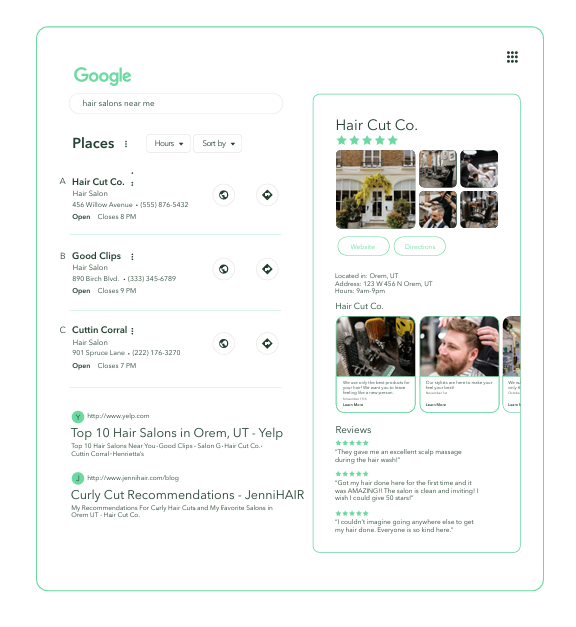Your Online Reputation IS Your Business Reputation Now
In a digital-first world, brand reputation management is now mission-critical for small businesses. Your first impression happens online, and strong brand reputation management ensures that the first thing prospects see supports your sales goals. People don’t just look you up, their perception is shaped before you ever speak. That’s why online reputation management and smart brand reputation management are essential: they tell potential customers whether you’re trustworthy or not.
Small businesses used to rely on word-of-mouth. Today, living reviews and search results make online reputation the primary influencer. To understand how to get your website to come up on Google, you must first accept that brand reputation management and online reputation management are ranking inputs. Good deliverables alone no longer guarantee visibility you need active business reputation management and a clear online reputation strategy.
What Is Online Brand Reputation Management?

Put simply, brand reputation management (also called online reputation management) is the set of actions you take to shape how customers, Google, and directories perceive your business. Brand reputation management fixes misinformation, encourages positive feedback, and builds trust signals that search engines and customers recognize.
Online reputation differs from perceived trust. Perceived trust is what people feel; online reputation is the evidence they find reviews, listings, backlinks, and GBP signals. Effective business reputation management blends reputation maintenance (monitoring and fixing problems) with reputation marketing (proactively building trust). Without online reputation management, even excellent service can be invisible in local searches and it won’t help how to get your website to come up on Google.
How Google Quietly Scores Your Reputation Google uses a local ranking model that rewards businesses that demonstrate reliable brand reputation management and genuine online reputation signals. Consider the three simple factors:
- Relevance: Are you optimized for the right searches? Proper brand reputation management includes keyword alignment and category selection to show Google what you do.
- Distance: Are you discoverable by nearby customers? This is where consistent business reputation management across listings matters.
- Prominence: Do other sites, reviews, and citations back you up? Prominence is the outcome of strong online reputation management and deliberate brand reputation management efforts.
If you want to know how to get your website to come up on Google, focus on these reputation signals. Prominence is a large part of brand reputation management and it depends heavily on active online reputation management.
Where Your Reputation Actually Lives Online (Hint: It’s Not Your Website)
Your online reputation lives where customers search and judge you:
- Google Business Profile (GBP) – the center of local brand reputation management. GBP acts as the modern storefront that displays your online reputation to searchers.
- Reviews – the heart of online reputation management. Reviews are social proof and ranking fuel for GBP and search.
- Directories & Citations – consistency across directories is a core part of business reputation management.
- Backlinks & Mentions – third-party references show Google your prominence and complete your brand reputation management picture.
- Behavior Signals – clicks, dwell time, and engagement reinforce your online reputation and inform how to get your website to come up on Google.
Treat these sites as the primary homes of your brand reputation management work. The website still matters, but online reputation management often has more immediate ranking impact.
The Real Reason Your Website Isn’t Showing Up on Google

Most small business owners blame page SEO, but the real issue is often weak online reputation. Google ranks trusted businesses higher; this is the practical side of brand reputation management. Without steady online reputation management work (reviews, citations, backlinks, GBP activity), your site will struggle to rank even if it’s technically solid.
If you want to learn how to get your website to come up on Google, invest in brand reputation management and business reputation management processes that generate consistent, local credibility.
The Small Business Reputation Blueprint
Here’s a step-by-step brand reputation management plan you can follow:
- Choose keywords aligned with reputation: Combine service + location keywords with brand reputation management terms to help Google understand intent and to answer queries about how to get your website to come up on Google.
- Optimize GBP exhaustively: Fill every field, select the right primary category, and use photos that reflect your quality — this is core online reputation management.
- Build review velocity: Ask for reviews regularly, encourage honest feedback, and follow up. That’s the engine of business reputation management.
- Fix directory consistency: NAP consistency is the backbone of trustworthy brand reputation management.
- Use GBP posts: Fresh content is a trust signal. Regular posts support online reputation management and help with how to get your website to come up on Google.
- Earn backlinks: Local partnerships, sponsorships, and press mentions feed your online reputation and enhance brand reputation management.
Follow this blueprint and your business reputation management will create momentum that makes it easier to rank.
Common Reputation Mistakes Small Businesses Make
Watch out for these traps that undermine brand reputation management:
- Treating GBP like a one time list instead of active online reputation management.
- Asking for reviews incorrectly too few or too many at once hurts your online reputation.
- Picking an incorrect category is a quick way to sabotage your business reputation management.
- Low-quality photos or missing images poor visuals damage brand reputation management.
- No local content strategy neglecting content limits how to show Google you deserve to come up.
Avoiding these errors protects the gains from your brand reputation management efforts.
The Future of Online Brand Reputation (2025 and Beyond)
AI and evolving search algorithms make brand reputation management even more important. Google’s shift toward trust-first ranking means online reputation management and business reputation management become competitive advantages. In crowded markets, businesses that invest in brand reputation management and a strong online reputation will stand out and make ranking queries like how to get your website to come up on Google far more achievable.
Turning Your Online Presence Into a Lead Engine
Reputation-driven marketing turns visibility into revenue:
- Reputation work drives traffic: smart brand reputation management leads to more local search visibility.
- Traffic turns into leads: a strong online reputation converts searches into inquiries.
- Leads become customers: consistent business reputation management improves conversion rates and customer lifetime value.
To scale this funnel, treat online reputation management as ongoing operations, not a one-off task.
Learn More with Green House’s Reputation Management Ebook
Ready to implement the full strategy and integrate business reputation management into your long-term growth plan? Green House can help! Download the E-book for our comprehensive guide on turning one-time buyers into loyal customers.
Get your copy here: https://fertilizer.thegreenhouseuvu.com/RM_ebook


